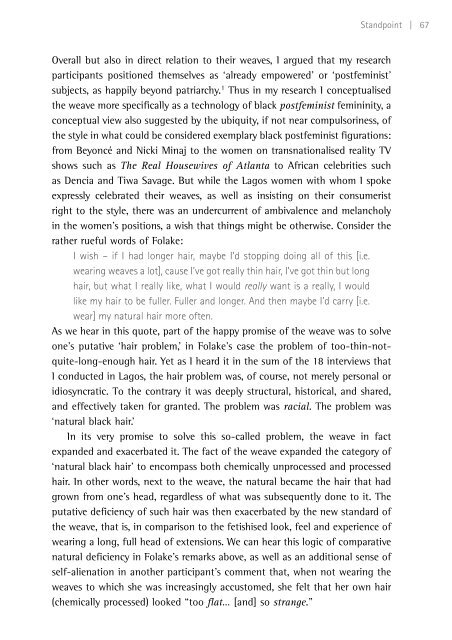The politics of fashion and beauty in Africa
fa21_proof_3
fa21_proof_3
You also want an ePaper? Increase the reach of your titles
YUMPU automatically turns print PDFs into web optimized ePapers that Google loves.
Overall but also <strong>in</strong> direct relation to their weaves, I argued that my research<br />
participants positioned themselves as ‘already empowered’ or ‘postfem<strong>in</strong>ist’<br />
subjects, as happily beyond patriarchy. 1 Thus <strong>in</strong> my research I conceptualised<br />
the weave more specifically as a technology <strong>of</strong> black postfem<strong>in</strong>ist fem<strong>in</strong><strong>in</strong>ity, a<br />
conceptual view also suggested by the ubiquity, if not near compulsor<strong>in</strong>ess, <strong>of</strong><br />
the style <strong>in</strong> what could be considered exemplary black postfem<strong>in</strong>ist figurations:<br />
from Beyoncé <strong>and</strong> Nicki M<strong>in</strong>aj to the women on transnationalised reality TV<br />
shows such as <strong>The</strong> Real Housewives <strong>of</strong> Atlanta to <strong>Africa</strong>n celebrities such<br />
as Dencia <strong>and</strong> Tiwa Savage. But while the Lagos women with whom I spoke<br />
expressly celebrated their weaves, as well as <strong>in</strong>sist<strong>in</strong>g on their consumerist<br />
right to the style, there was an undercurrent <strong>of</strong> ambivalence <strong>and</strong> melancholy<br />
<strong>in</strong> the women’s positions, a wish that th<strong>in</strong>gs might be otherwise. Consider the<br />
rather rueful words <strong>of</strong> Folake:<br />
I wish – if I had longer hair, maybe I’d stopp<strong>in</strong>g do<strong>in</strong>g all <strong>of</strong> this [i.e.<br />
wear<strong>in</strong>g weaves a lot], cause I’ve got really th<strong>in</strong> hair, I’ve got th<strong>in</strong> but long<br />
hair, but what I really like, what I would really want is a really, I would<br />
like my hair to be fuller. Fuller <strong>and</strong> longer. And then maybe I’d carry [i.e.<br />
wear] my natural hair more <strong>of</strong>ten.<br />
As we hear <strong>in</strong> this quote, part <strong>of</strong> the happy promise <strong>of</strong> the weave was to solve<br />
one’s putative ‘hair problem,’ <strong>in</strong> Folake’s case the problem <strong>of</strong> too-th<strong>in</strong>-notquite-long-enough<br />
hair. Yet as I heard it <strong>in</strong> the sum <strong>of</strong> the 18 <strong>in</strong>terviews that<br />
I conducted <strong>in</strong> Lagos, the hair problem was, <strong>of</strong> course, not merely personal or<br />
idiosyncratic. To the contrary it was deeply structural, historical, <strong>and</strong> shared,<br />
<strong>and</strong> effectively taken for granted. <strong>The</strong> problem was racial. <strong>The</strong> problem was<br />
‘natural black hair.’<br />
In its very promise to solve this so-called problem, the weave <strong>in</strong> fact<br />
exp<strong>and</strong>ed <strong>and</strong> exacerbated it. <strong>The</strong> fact <strong>of</strong> the weave exp<strong>and</strong>ed the category <strong>of</strong><br />
‘natural black hair’ to encompass both chemically unprocessed <strong>and</strong> processed<br />
hair. In other words, next to the weave, the natural became the hair that had<br />
grown from one’s head, regardless <strong>of</strong> what was subsequently done to it. <strong>The</strong><br />
putative deficiency <strong>of</strong> such hair was then exacerbated by the new st<strong>and</strong>ard <strong>of</strong><br />
the weave, that is, <strong>in</strong> comparison to the fetishised look, feel <strong>and</strong> experience <strong>of</strong><br />
wear<strong>in</strong>g a long, full head <strong>of</strong> extensions. We can hear this logic <strong>of</strong> comparative<br />
natural deficiency <strong>in</strong> Folake’s remarks above, as well as an additional sense <strong>of</strong><br />
self-alienation <strong>in</strong> another participant’s comment that, when not wear<strong>in</strong>g the<br />
weaves to which she was <strong>in</strong>creas<strong>in</strong>gly accustomed, she felt that her own hair<br />
(chemically processed) looked “too flat… [<strong>and</strong>] so strange.”<br />
St<strong>and</strong>po<strong>in</strong>t | 67



